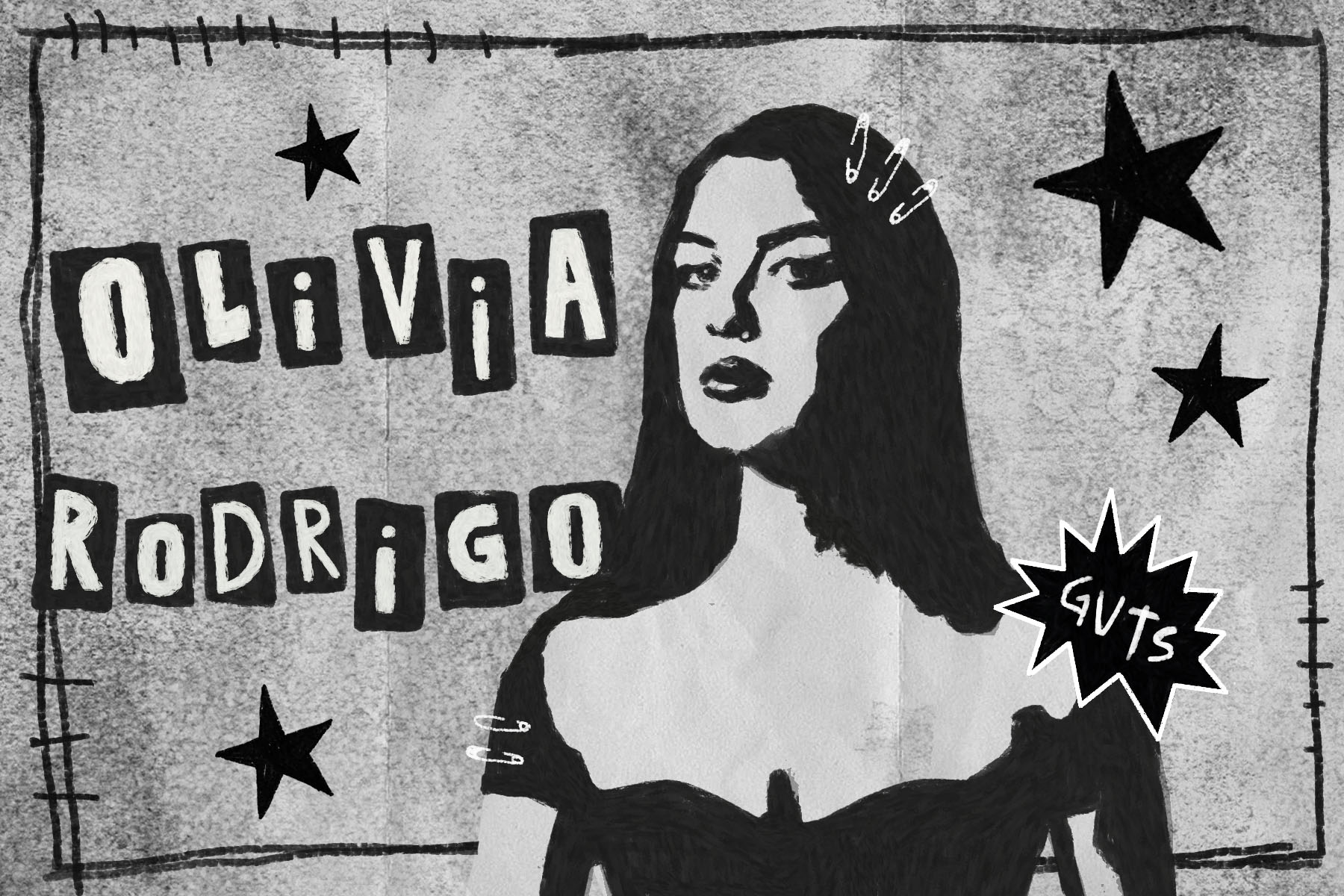Olivia Rodrigo’s success didn’t blossom slowly. It exploded.
It’s not common for someone so young to win a Grammy on their debut album. While impressive, it wasn’t clear where all this early success would lead her. It was soon clear that “SOUR” was easy for her to top.
This September, Rodrigo released her sophomore album, “GUTS,” and it is everything and more than her debut. While “SOUR” may have been awarded for its timeless pop energy, “GUTS” is the female punk rock album that came completely unexpected from Rodrigo.
Rodrigo brings a refreshed take on the sound of female punk rock artists of the 90s and early 2000s back into the mainstream. This is a bold move to make, and she did not fail to impress. When listening to this album for the first time, I didn’t know what to expect.
Starting from the top of the album with “all-american bitch,” I was comforted by the familiar acoustic Rodrigo sound that fans have been gushing over since her “High School Musical: The Musical: The Series” days. The stripped down instrumental is soon replaced by a powerful drumline and wailing electric guitar as her internal commotion shatters the sweet, external persona. This song switches back and forth with every verse, from the typical “kind” and innocent Olivia that fans fell in love with, back to a rebellious version of Olivia.
The rageful sound is reminiscent of artists such as Avril Lavigne, Gwen Stefani, Alanis Morissette and Hayley Williams. These artists embraced the rising popularity of punk rock throughout the late 20th century, and found their success in this genre as women.
The sentiment that you can do what you want is clouded by the expectation that you also have to be “ladylike” — crossing your legs and keeping your opinions hushed for the sake of being “polite.”
These artists use their music —the raging guitars, the smash of a cymbal, the guttural roars— as a means to release what they are expected to cage. The frustration of being likable is aggravating and music is an act of liberation.
This is the style that Rodrigo carried through the album; a style that empowers women to express their rage.
Beyond the sound and style of the new album, Rodrigo has taken her lyricism to new heights. The theme of her writing throughout the album is consistent and perfectly complements its punk sound. The story she tells is the autobiographical perspective of a girl trying to navigate her feelings internally and how to express those feelings externally.
This wasn’t easy for Rodrigo, though. In an interview with Apple Music, she expresses, “I couldn’t sit at the piano without thinking about what other people were going to think about what I was playing. I would sing anything and I’d just be like, ‘Oh, but will people say this and that, will people speculate about whatever?’” Rodrigo’s vulnerability shines through in this expression, as she labels herself as a woman who is unsure of how to make the right decision for herself without offending her onlookers.
Rodrigo is now 20 years old. Women at this age who are in the midst of finding themselves — especially wildly successful women such as Rodrigo — are often criticized for being fake, manipulative and/or attention seeking. This is exactly what this album delivers through its lyrics, as Rodrigo admits to her wrongdoings while explaining them parallel to her perspective. These contradictory “parallel” perspectives are a theme throughout the album.
In “all-american bitch,” her lyrics describe her mental battle of trying to withhold her aggressive internal feelings while simultaneously portraying the persona of a carefree, happy girl. She writes, “I don’t get angry when I’m pissed / I’m the eternal optimist / I scream inside to deal with it, like,” and with that, she proceeds to unleash her pent up anger and lets out an array of screams for an entire 20 seconds before snapping right back into the lyrics, “All the time / I’m grateful all the time / I’m sexy, and I’m kind / I’m pretty when I cry.”
In “ballad of a homeschooled girl” her lyrics describe her social anxiety, as she struggles to feel like this persona is coming off in a likable way. In the chorus, she writes, “I broke a glass, I tripped and fell / I told secrets I shouldn’t tell / I stumbled over all my words/ I made it weird, I made it worse / Each time I step outside, it’s social suicide.” Despite all of her embarrassment, she continuously attempts to go out and socialize; something anyone can relate to. Through writing this, Rodrigo lets listeners know it’s not something to be ashamed of.
The song, “get him back!” describes the love-hate relationship towards her ex, as she wants to be with him again only to break his heart like he did hers. She writes, “I wanna key his car, I wanna make him lunch / I wanna break his heart, stitch it right back up / I wanna kiss his face with an uppercut / I wanna meet his mom, and tell her her son sucks.” This song is an important acknowledgement of toxic relationships, and she perfectly describes the trials of getting out of one through these lyrics.
After experiencing the emotional rollercoaster of this album, I wondered why this type of female music disappeared in the first place. There was a point in time where artists who expressed female rage existed in the mainstream.
Today, it seems increasingly difficult for women to get rewarded for this type of expression — if they even feel comfortable with this type of vulnerability in the first place. Olivia Rodrigo has already been recognized as a very successful female artist, but she deserves additional praise for having the “guts” to bring this genre back from the dead.















